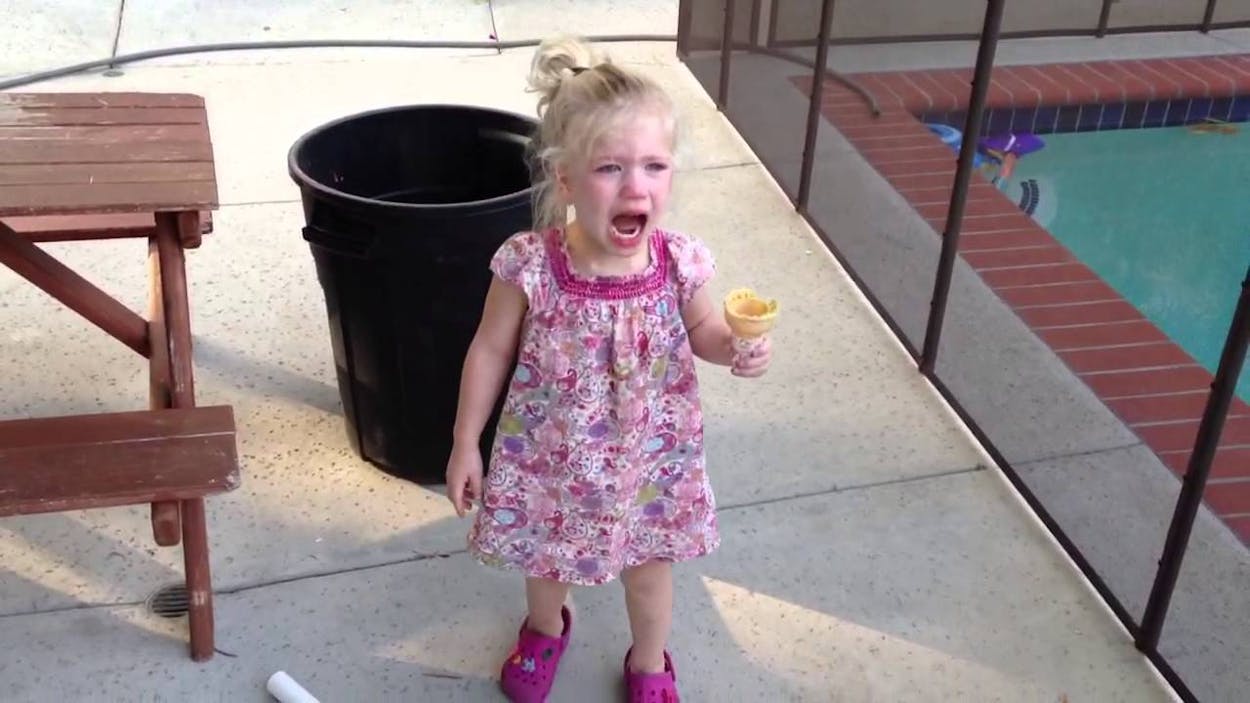In the midst of our ice cream shortage, just about every Texan can relate to that little girl. But to the relief of a deprived nation, Blue Bell Creameries announced this week that it’s making a tentative comeback. The company “hopes” to start test production in its Sylacauga, Alabama, facility in the next several weeks. “When production resumes at the Sylacauga plant, it will be on a limited basis as the company seeks to confirm that new procedures, facility enhancements and employee training have been effective,” the company said in a press release. “Upon completion of this trial period, Blue Bell will begin building inventory to return to the market.”
For many, the announcement couldn’t have come soon enough. After the original listeria outbreak in March and the subsequent total recall, Texans began having a, er, meltdown. Two hundred people attended an actual prayer vigil in the creamery’s hometown of Brenham, then in May, a Blue Bell black market began on Craigslist (one Dallas seller was asking $10,000 for a gallon of Caramel Turtle Cheesecake—with a bowl’s worth missing). And, of course, there was this:

As Texas Monthly’s own Mimi Swartz noted in her great June piece:
The supportive yard signs easily stretched all the way to Houston. Bun B voiced his support on Instagram. Gallery Furniture took out full-page ads. The “Come and Take It” flag, the one used by soldiers in the Battle of Gonzales in 1835, showed up affixed to the Blue Bell logo all over the Internet.
Swartz, rather perfectly, declared that “ice cream is Proustian.” It conjures up moments of childhood and family better than most foods. And I have have my own Blue Bell–specific memories—the old man gave up the more dangerous vices and he replaced them with one guilty pleasure, bought by the gallon and eaten by the bowlful. That was childhood, though, and as Maw and Pops got older and more health-conscious, they switched to sorbet. Then they stopped with the sweets altogether. I shed no tears.
This is partly to explain why, as a non-native Texan whose parents were espoused anti-materialists, the unchecked loyalty in wake of Blue Bellghazi is so dern … curious.
As homegrown and delicious as Blue Bell might be, it’s worth reviewing how the company created and responded to this catastrophe—a series of missteps that baffled legal and food safety experts. In May, the Houston Chronicle reported that Blue Bell found “strong evidence” of listeria in one of its Oklahoma factories in 2013, but failed to correct the issue. The Houston Press detailed the company’s “plant environmental testing plan” through a private lab. Although factory swabs were routinely tested for pathogens, Blue Bell only looked at areas that didn’t have contact with ice cream.
Blue Bell further confounded experts with its first attempt at pulling the dangerous products. It initially tried to quietly remove products back in February before people started getting sick. Unlike a complete recall, these withdrawals don’t require public notice, a particularly scary thought considering the outbreak was linked to three deaths. From the Dallas Morning News:
“With something like this, I don’t understand how they got away with doing a withdrawal,” said Cliff Coles, president of California Microbiological Consulting Inc. “Withdrawal is not nearly as strong of language as a recall. If you knew that you had listeria, why wasn’t it a recall?
If Blue Bell had tackled the problem head on, it could’ve meant drastically different results. As food safety lawyer Bill Marler noted in the Houston Press:
“If [Blue Bell executives] had been more transparent and forthcoming about this instead of trying to control the story and not commenting for so long, things might have been different, they might have saved jobs.”
Although Blue Bell Creameries might have started off as a humble, aw-shucks local operation, it is, at the end of the day, a business. And an ambitious one at that: it now sells its product in twenty states, has 3,900 employees (before the May layoffs of 42 percent of them), and is the third-ranked ice cream company, nationally, with about $880 million in sales.
Blue Bell isn’t the only ice cream company to have a listeria problem, either. In the past year both Ohio-based Jeni’s Splendid Ice Cream and Washington’s Snoqualmie Gourmet Ice Cream experienced the exact same problem. Their response? Immediate recalls. As for Blue Bell’s aw-shucksness, president and CEO Paul Kruse first responded publicly with a very apologetic video. Now he has no comment (dern lawyers).
Blue Bell isn’t some evil, greedy corporation. It’s Brenham’s second-largest employer and has been part of people’s lives for a century-plus. But maybe (just maybe!), as the company begins to try to come back from what seems like a series of careless and dangerous blunders, Texans could work to create different brand nostalgia, new traditions, fresh Proustian moments. Barbecue and chili are so great in this regard because they’re delicious memories that can be made at home, amongst friends and family (and hopefully without listeria). Maybe there should be a homemade ice cream revolution!
Texans have endured change before. There were plenty of remembrances, eulogies, and obituaries for Dublin Dr Pepper, but we seem to be doing okay since its demise. At the very least, perhaps, it’s best to be more like Texas scribe Larry McMurtry—a bit suspicious of the old myths and legends. Unless, of course, we’re talking about Lone Star beer. Should that disappear, the Republic would fall.
(images via YouTube/firewifesadie)
Follow Jeff Winkler on Twitter






